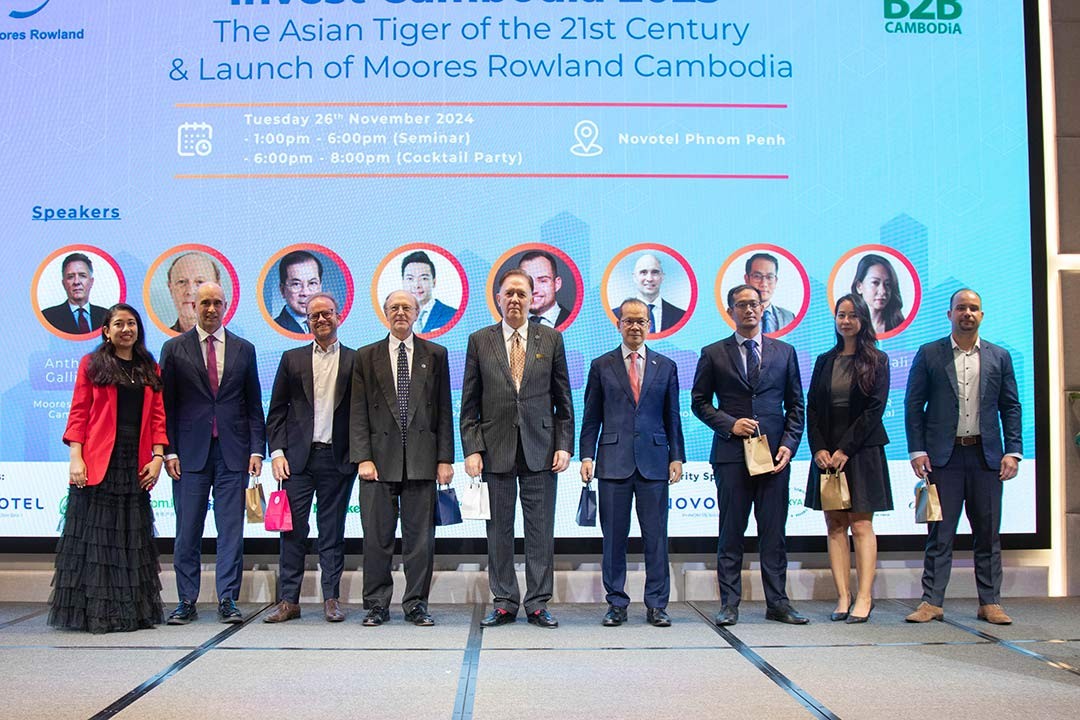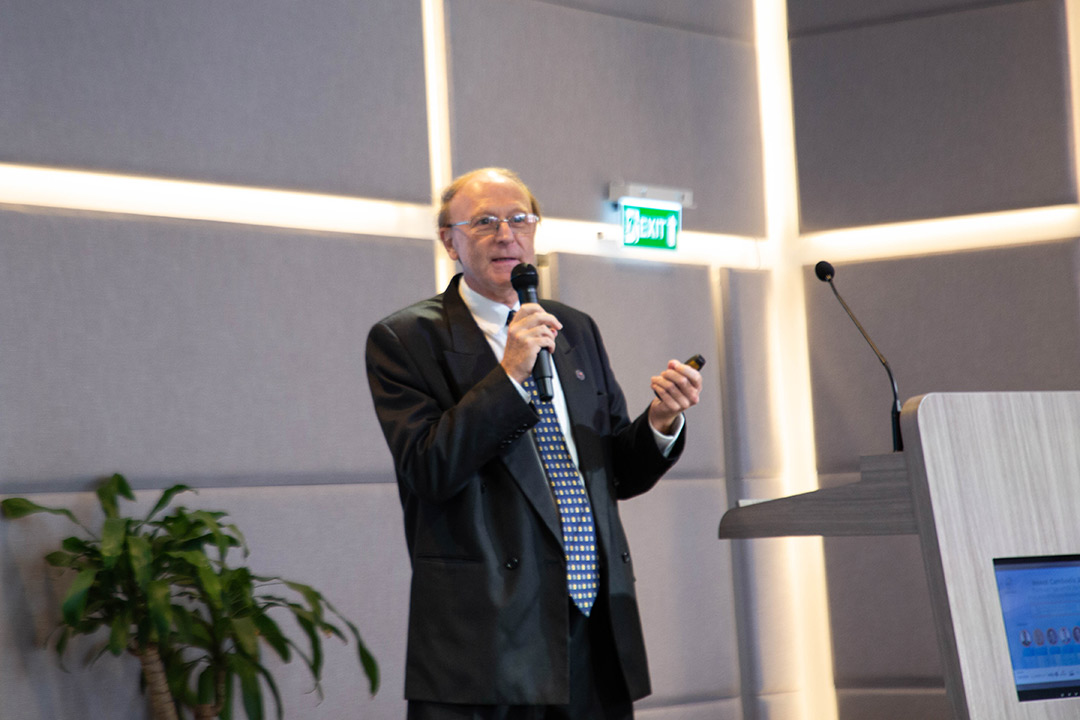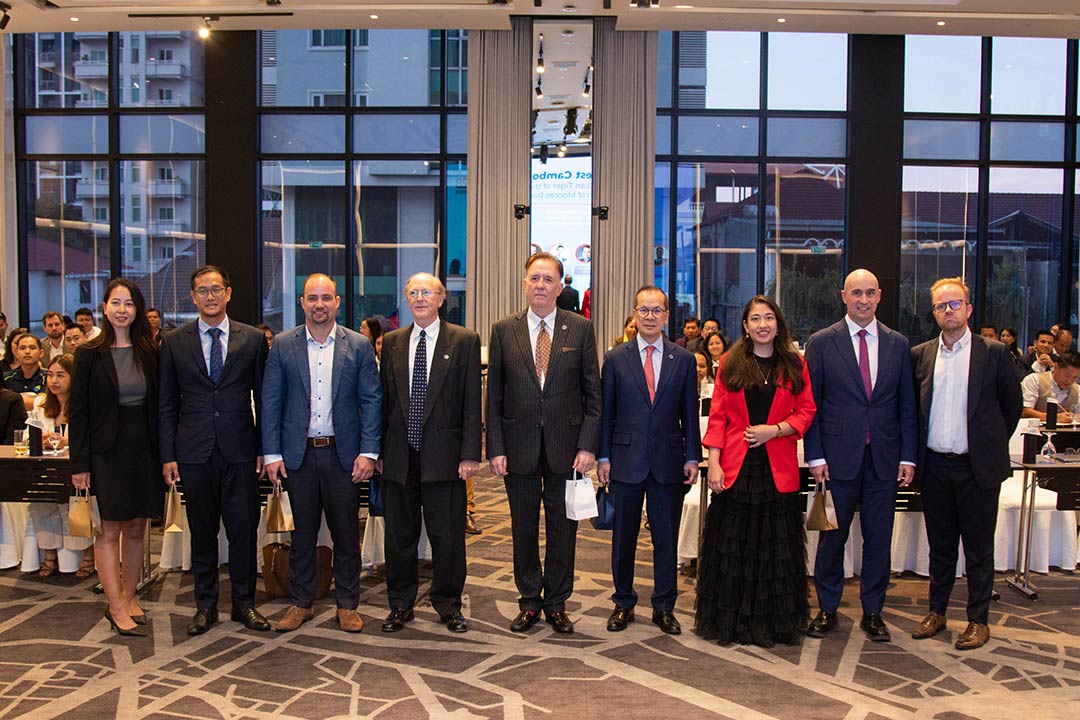
B2B Cambodia and Moores Rowland Cambodia jointly-hosted ‘Invest Cambodia 2025: The Asian Tiger of the 21st Century’ on November 26, 2024, at the Novotel Phnom Penh, bringing together industry leaders, investors and experts to discuss critical topics including ESG audits, real estate opportunities, digital asset growth and the scope of Hong Kong and China’s investments in Cambodia.
The half-day seminar was attended by around 100 participants and was dedicated to exploring Cambodia's vibrant investment landscape and its emerging role in Asia’s economy. The event also marked the official announcement of Moores Rowland Cambodia's launch, highlighting a new strategic development within the Cambodian business community.
“I want to recognise that Cambodian Investment Management (CIM) Accounting Services will now become Moores Rowland Cambodia,” said Anthony Galliano, CEO of CIM, during his opening remarks.
The integration of our group, now into Moores Rowland, is very helpful… this integration will add something that's becoming very important, new capabilities, and one of those new capabilities is ESG audits… Europe and the US are very concerned about ESG in the factories and the investments that they make here, so we'll be able to do that. I don't know any other company on the ground that's doing it yet, so I hope we're the first.
Other new capabilities Galliano highlighted that joining the Moores Rowland Asia Pacific network will bring to his company include:
- ISO certification
- Trust expertise and advisory
- Expanded corporate financing services integrating with OBOR Capital
_20241128_121132.jpg)
Setting The Stage For Cambodia’s Investment Landscape 2025
In his remarks, Galliano explained the core of his mission to raise more awareness about Cambodia as an ideal investment destination.
“Cambodia has achieved spectacular economic success over the last two decades, and I don't think Cambodia gets the recognition it deserves for that success, and my goal is to increase the visibility and the understanding of Cambodia as an attractive investment destination,” he said.
What has Cambodia done to deserve this? Besides the typical GDP growth, which we all talk about, it's reduced poverty, it's got tremendous political stability… It's ranking now as a lower middle income status country with a goal to become upper middle by 2030, and it's just a matter of time. In fact, Cambodia already qualifies as graduating from least developed country status.
Measuring Cambodia’s Success As An Economy
Galliano shared what he called his personal ‘investment keys’, which he considers important variables for measuring Cambodia's success as an economy.
First, on the country’s growth, he shared how Cambodia’s GDP went from USD 3.65 billion in 2000 to almost USD 42 billion (rebased) in 2023. From 2000 to 2023, the country’s average GDP growth rate was also 7 per cent, which is faster than the average growth rate of the ASEAN region (5 per cent) and the global economy (3 per cent).
Other variables he detailed were:
- Foreign Direct Investment (FDI) – Between 2018-2023, FDI reached USD 48.4 billion in the country. Between 2000-2023, the compounded annual growth rate of FDI was 18.5 per cent.
- Exports – Cambodia's exports grew from USD 1.4 billion in 2000 to now USD 22.6 billion, with a compounded annual growth rate of 13.5 per cent.
- Poverty reduction – More than half the population in Cambodia was in poverty in 2004 (53.2 per cent national poverty rate), a percentage which has dropped to 17 per cent today. In comparison, the national poverty rate in the US is 12 per cent.
- Little to no unemployment – Cambodia has one of the lowest unemployment rates in the world, at just 0.24 per cent. The average rate of unemployment between 2000-2023 was 0.57 per cent.
- Inflation – Cambodia’s inflation rate from 2000-2023 was 3.69 per cent, lower than the global average of 3.8 per cent. Currently, inflation is at 2.13 per cent, where the global average right now is 5.69 per cent.
- Low public debt – Cambodia’s public debt is at around USD 12 billion in 2024, which is 28.5 per cent of the GDP. The global average is 93 per cent, so the country has significant capabilities to increase the public debt, if needed.
- Foreign exchange reserves – This is one area Galliano admitted Cambodia is not doing great, but he continues to see growth in the area. Cambodia’s foreign exchange reserves is currently at USD 16.5 billion, and the import coverage ratio is at around 6.6 months (in comparison, the Southeast Asian average is 7.7 and the world average is 9.3)
- Stable currency – Cambodia’s currency, the Khmer Riel (KHR), has ranged in the last 20 years from KHR 3,870 to about KHR 4,143, with less than 5 per cent movement. Galliano attributes this stability to dollarisation.
- Stock market performance – This is still an emerging frontier market, but Galliano sees the future of Cambodia’s investment potential lying in this field
_20241128_120735.jpg)
Some of the main benefits of investing in Cambodia as an international investor Galliano detailed were:
- Possibility of 100 per cent foreign ownership
- Dollarised economy
- Strategic location in the ASEAN region
- Qualified investment project (QIP) mechanism, which provides legal and financial incentives to those projects which qualify
- Several free trade agreements (FTAs), such as with China and South Korea and the Regional Comprehensive Economic Partnership (RCEP)
- Lower corporate taxes than in the region – on average, corporate taxes are at around 23 per cent in ASEAN, while in Cambodia it is 20 per cent on average
- No restrictions on currency transfers, meaning investors can transfer money in and out of the country easily
- Young population and workforce.
Increasing Interest For Sustainability And ESG Audits
Baudouin Coomans, Partner at Moores Rowland Indonesia, one of two international guest speakers who attended the event representing Moores Rowland in the Asia Pacific, presented on one of the new product offerings coming to the Cambodian market through Moores Rowland Cambodia – sustainability and ESG audits.
Speaking about his experience in Indonesia, Coomans explained how more and more companies are now requesting for services to complete or assess ESG and sustainability reports in order to demonstrate a high level of compliance.

“Indonesia being a relatively large country in the field of mining and plantation, ESG and sustainability is extremely important,” said Coomans “We have about 600 public listed companies, and those companies have to issue sustainability reports.”
Furthermore, millennials, younger people, when they have audit reports of companies in their hands, the numbers may be of much interest, but they're very fast in checking what a company is doing in terms of sustainability to see if they should eventually invest and buy shares in that company, so the sustainability issues are becoming more and more important.
Sustainability reporting can help organisations measure, understand and communicate their economic, environmental, social and governance (ESG) performance, and then set goals and manage change more effectively. Coomans added that in Indonesia, ESG and sustainability assurance accounts for about 10 per cent of Moores Rowland’s turnover, a sizable chunk of the company’s activity.
Hong Kong And China Investment Into Cambodia
Thomas Lee, Practicing Director at Moores Rowland Hong Kong, the second international guest speaker, discussed the scope of Hong Kong and China investment into Cambodia, which he summarised as being large and most likely also quite long-standing.
“Advantage number one [of Cambodia] is the cost benefit, because there is cheaper land and cheaper labour costs,” said Lee.
[Many companies] used to have factories in China, but the labour costs in China have become very expensive, and average wages, together with social contribution, is close to USD 1000 a month for each worker, so it’s becomes very expensive for some companies to remain, so they move the bulk [of operations] outside of China.
Lee underlined greater market access to the US, EU, and other ASEAN countries as a benefit Cambodia provides Chinese investors. If they produce in Cambodia, they can avoid customs duty and enjoy local benefits, which includes trade agreements Cambodia has with countries in the ASEAN region and beyond.
_20241128_121012.jpg)
He also highlighted the Greater Bay Area in China, with a population close to 100 million, as a business, trading and investment hub that is increasingly producing more investors and entrepreneurs who have an interest in coming to Cambodia and other ASEAN countries.
“Beijing, Shanghai, Canton (Guangzhou) and Shenzhen, these are the major cities [of the Greater Bay Area], and yet these cities, unlike Cambodia, are under foreign exchange control,” added Lee. “If there is no foreign exchange control, I think there is a lot which can be done, such as establishing a family office, wealth management, PTC (public trust companies) and foreign investment coming in and out of Cambodia.”
You (the business community) should insist that Cambodia continues to not have foreign exchange control, as well as to have a favourable tax system, with a good Government, good education, and a young generation. China is aging, Hong Kong is aging, but Cambodia is very young.
Covering A Wide Range Of Areas Presenting Investment Opportunities
In addition to the two international speakers from the Moores Rowland Asia Pacific network, the seminar featured insightful presentations and Q&A sessions from five leaders and experts from different fields within Cambodia’s business community:
- Tom O’Sullivan, CEO and Director of Realestate.com.kh, who presented on the current real estate landscape and what opportunities are present;
- Thomas Schings, General Manager Securities and Trade Division at the Royal Group of Companies, who presented on Cambodia’s digital asset landscape;
- Casey Barnett, President of CamEd Business School and President of the American Chamber of Commerce (AmCham) in Cambodia, who presented on a recent survey conducted by AmCham on the business climate;
- Sylvain Ung, Investment Director at OBOR Capital, who presented on investment readiness, particularly for startups and small and medium-sized enterprises (SMEs);
- Chanmali Liv, Corporate Finance Director at OBOR Capital, who presented on company valuation and investment attractiveness.
The ‘Invest Cambodia 2025: The Asian Tiger of the 21st Century’ seminar concluded with a charity lucky draw, with all proceeds going to benefit ISF Cambodia. The evening ended with a special cocktail reception, allowing all participants to mingle and network with one another.

B2B Cambodia extends its deepest thanks to all of its event sponsors and charity sponsors. ‘Invest Cambodia 2025: The Asian Tiger of the 21st Century’ would not have been possible without the support of our Gold Sponsor and Hotel Partner Novotel Phnom Penh, Gold Sponsor Realestate.com.kh, and Bronze Sponsors ACLEDA Bank, Heineken Cambodia and Backyard Cafe.
We also thank our lucky draw charity sponsors: Raffles Hotel Le Royal, Oakwood Premier Phnom Penh, Knai Bang Chatt, Backyard Cafe and Novotel Phnom Penh.
Stay tuned for more articles and videos from B2B Cambodia and Moores Rowland Cambodia’s first major event!